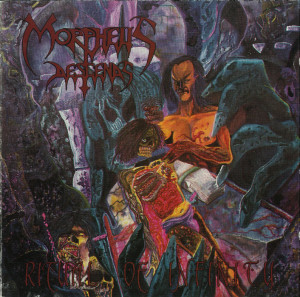Sadistic Metal Reviews started sometime in the early 00s in tribute to the reviews of fanzines from earlier eras, in which a single sentence correctly categorized a band as the type of useless filler it was and dispatched it to the cut-out sale bins of history.
The grim fact is that as in nature, in heavy metal there are a few winners, and everyone else fails. This isn’t because they are fated to do so, but because they made the wrong choices. Usually, they have no actual artistic motivation, and so are imitating other successful acts for chicks, beer, prestige, an excuse for being stoned in the basement for a decade, whatever.
A band may have spent years learning its instruments, rehearsed for months, hired a good studio, taken all the right notes and had all the right parts, but something didn’t add up. This band had nothing to say, and so no one should listen.
The guiding principle of Sadistic Metal Reviews is that no amount of surface aesthetic can cover up a lack of conviction, content and motivation within. No one can paint-by-numbers imitate, or its cousin the recombining of known styles, and hope to get anything but a polite nod and “It’s OK, I guess, if you like that kind of thing.”
With this edition, SMR takes on the retro phenomenon. Every seven years like clockwork the great factory of wannabes runs out of “new” (usually basic math, like adding two genres together and getting a mystery) ideas and decides that ripping off the past is the safest path to fame and riches.
Hence these imitators are on the altar of sacrifice, awaiting our Sadistic Metal Writers for today’s edition of SMR, which tackles possibly the worst form of retro ever… the wannabe be 1991 Swedish death metal retro.

Our writers, from left to right: Daniel Rodriguez, Cory van der Pol, Max Bloodworth and Jon Wild.
 Repugnant – Epitome of Darkness
Repugnant – Epitome of Darkness
Despite being disguised in every “Swedish death metal” cliche known to man, Repugnant appears to be a retro-thrash band that re-purposes early Entombed lyrics for ironic comic book appeal. This vapid gimmickry with a glossy coat betrays the similarity between this band and Ghost, with whom it shares personnel. Why not try the same shallow stunt, but dress it up as old Entombed for extra clueless metal tourist nu-fan dollars?
 Entrails – Raging Death
Entrails – Raging Death
This album of Carnage riffs played backward between stolen Nihilist d-beats feels like a flowchart experiment in paint-by-numbers Swedish death metal cliches, with added groove so that even lobotomy patients can tap their feet to it. Entrails lay claim to the early Swe-death scene, but even a blatant clone band can be aim for higher than almost passable. If you take away the buzz-saw distortion, these are just old Saxon tunes sped up with more howling.
 Evocation – Illusions of Grandeur
Evocation – Illusions of Grandeur
Why do bands constantly recreate Slaughter of the Soul? Perhaps because it’s so easy to do. Evocation make forgettable muzak by giving laundry detergent commercial jingles the mid-90s Swe-death post-Deliverance-style rape treatment. This pop muzak sounds every bit as bittersweet as a sad Blink 182 song but in disguise as mid 90s Scandinavian metal to allow Century Media to market it to metalcore kids on Youtube. More “another day at the office” unremarkable mellow-deaf who are given more legitimacy than the other bands for being around in the early 90s. It’s still butt rock with polka drumming and laryngitis vocals.
 Nominon – Monumentomb
Nominon – Monumentomb
What most people got out of Swedish death metal was a certain guitar tone and vocal delivery. Complex riff arrangements, time signatures, melodies? Over their heads. So why burden the little dears with something they can’t understand? Instead, take the same music that bad Exodus clones were making in 1987 and dress it up in a “Sexy Swedish Slut Death Metal” Halloween costume. The only people who fall asleep when listening are the smart ones, and we should probably shoot them anyway.
 Hail of Bullets – On Divine Winds
Hail of Bullets – On Divine Winds
Classic death metal is hard. What’s easy? Metalcore, which is any variation of metal where you use hardcore songwriting with metal riffs. Don’t worry about making the riffs make sense, just have the song go from one ludicrous riff to the next as if they were connected. Then have a mosh part. Hail of Bullets is aggressive like old school death metal turned up to ten, but disorganized so you hear mostly noise.
 Kaamos – Kaamos
Kaamos – Kaamos
Remember all those Swedish bands who were almost up there with Entombed, but then dropped out? They dropped out because “not good enough” doesn’t mean you missed good by a hair, but a mile. Kaamos is reconstituted from also-rans in the Swedish scene and it sounds like it. These two chord riffs have zero personality mainly because their creators are obsessed with sounding Swedish. If this band were honest, Samba music would come out of the speakers instead.
 Tribulation – The Horror
Tribulation – The Horror
What happens if you dress up Def Leppard in Swedish buzz-saw distortion and death metal tempo? I don’t know, because this isn’t as good as Def Leppard. It is however candy heavy metal with every third riff an AOR melodic transition but put into typical Swe-deth(tm) packaging, including Sunlight Studios (Boss Heavy Metal pedal dimed) production, wacky energetic drumming, and barfing pit bull vocals. But once you look below the surface, it’s a power ballad.
 Bloodbath – The Fathomless Mastery
Bloodbath – The Fathomless Mastery
Bloodbath is just a bunch of jaded guys from whine rock bands (Katatonia and Opeth) making a parody out of death metal by throwing backwards Dismember riffs into a blender alongside Pantera groove metal riffs. For credibility they add the tremolo riff from Morbid Angel’s “Dawn of the Angry” to be a sufficiently quirky lifestyle product for people who ironically wear Entombed trucker hats and talk wistfully of the early 1990s, when they were four.
 Death Breath – Stinking Up the Night
Death Breath – Stinking Up the Night
This all-star band with Scott Carlsson (Repulsion) and Nicke Andersson (Entombed) applies the Clandestine model of pairing up horror movie motifs on guitar with d-beats. Using a rhythmic approach that alternates between Repulsion’s high-intensity riding blast and a Motorhead-derived groove, this band is competent but formulaic. It escapes the rancor derived at its genre-mates for being what seems like something closer to an honest effort.
 Morbus Chron – Sleepers In The Rift
Morbus Chron – Sleepers In The Rift
Morbus Chron suffers from flowchart death metal syndrome: play d-beat punk played on down-tuned guitars like the old school bands, toss in a stolen Sabbath riffs to remind people of the obligatory Autopsy influence, then maybe inject a zany Demilich/Cadaver “wacky sounding” riff to come off as “outside the box” and “original.” It feels like Entombed met up with a focus group who accidentally purchased a bunch of Oxycontin and tried to replicate Autopsy’s Acts of the Unspeakable.
6 CommentsTags: Bloodbath, entrails, Evocation, hail of bullets, Kaamos, Morbus Chron, nominon, Repugnant, retro metal, sadistic metal reviews, Swedish Death Metal, trends mosh core fun, tribulation
 If you’re tired of having fruity alt-rock interrupting your metal experience, you’re not alone. Polish black metal band Black Altar is set to release their EP Suicidal Salvation via Darker than Black Records; and thankfully, the release avoids many of the flaws of contemporary bands.
If you’re tired of having fruity alt-rock interrupting your metal experience, you’re not alone. Polish black metal band Black Altar is set to release their EP Suicidal Salvation via Darker than Black Records; and thankfully, the release avoids many of the flaws of contemporary bands.











 Originating from Kansas in 1998,
Originating from Kansas in 1998, 








